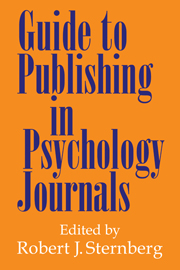12 - Reading Reviews, Suffering Rejection, and Advocating for Your Paper
Published online by Cambridge University Press: 05 February 2012
Summary
If all you have ever received are letters accepting your paper for publication, you need not read this chapter. You are a member of a very small group; chances are its members would fit on the head of a pin. Most psychologists who write for publication, including those who are themselves editors, those whose names are well known, and those who seem to be able to place their papers everywhere, are the recipients of far more rejection letters than they have publications. For every paper that is published, there are likely to have been multiple submissions, most of them resulting in rejection. Next time you see a vita with 30 publications, you may correctly surmise that there are approximately 100 rejections letters behind it. How many rejection letters have you notched in your belt? If it is fewer than a dozen, you have only just begun.
To help keep your acceptance to rejection ratio within limits that are tolerable to you, there are small things you can do that will sometimes make a difference if a paper is straddling the line between a chance at publication and being sent home without a prize. These suggestions are based on the premise that the scholarly publishing process, like any other collective endeavor undertaken by humans, has developed its own informal but powerful norms and is guided not only by written rules, but by custom. Knowing the customs, or having tacit knowledge of the editorial process, gives one an advantage.
- Type
- Chapter
- Information
- Guide to Publishing in Psychology Journals , pp. 169 - 186Publisher: Cambridge University PressPrint publication year: 2000
- 3
- Cited by



